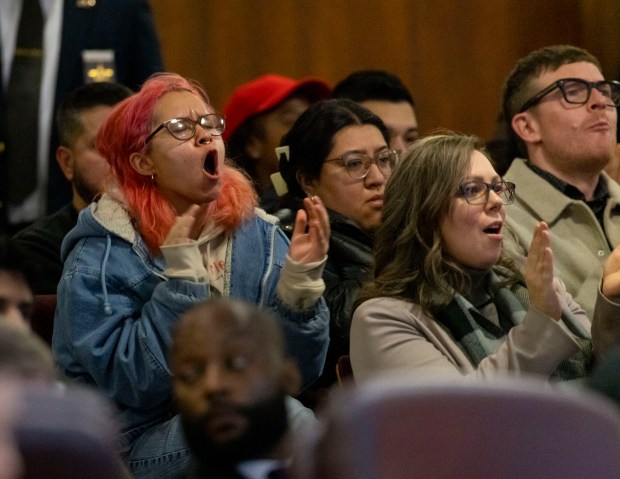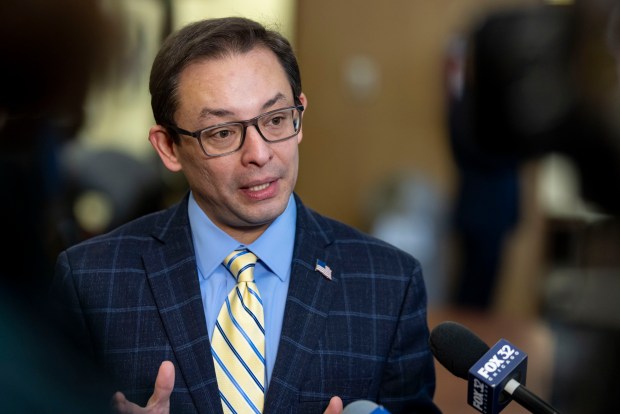An effort by opponents of Mayor Brandon Johnson to water down Chicago’s sanctuary city ordinance faltered in the City Council Wednesday, a victory for the mayor as his administration prepares for the looming threat of deportations under incoming President Donald Trump.
Aldermen voted 39-11 to table the vote on an amendment from Southwest Side Alds. Raymond Lopez, 15th, and Silvana Tabares, 23rd, to allow Chicago police to work with federal agencies on cases with individuals accused or convicted of gang activity, drug-related crimes, sex trafficking or sex crimes with minors. The two used a parliamentary move to attempt to force a full vote in the council, but the Johnson administration’s campaign with progressive allies and immigration advocates succeeded at beating back the legislation.
The failed vote was no surprise; even if Lopez’s amendment had passed, there would have been a 34-vote hurdle to clear a potential mayoral veto. But the council contingent of conservative and moderate aldermen are expected to continue resisting the freshman mayor’s agenda, including on immigration, a subject at the forefront of Chicago leaders’ minds ahead of the federal government switching to a Republican-led trifecta after next Monday’s inauguration.
Chicago’s sanctuary city ordinance, which has existed in some form for decades but was sharpened during Trump’s first term, bans official cooperation between local law enforcement and federal deportation authorities while ensuring immigrants living without legal permission can use city services. That serves to give immigrants in the country without legal permission some assurance they can report crime without fearing deportation, while taking away a key resource for Immigration and Customs Enforcement and other federal agencies to locate detainees.
Lopez, who met with the president-elect’s border czar Tom Homan in December, has maintained his proposed change would protect the vast majority of immigrants in Chicago communities such as his Southwest Side ward.
That line of reasoning hinges on Homan’s recent request that sanctuary cities like Chicago work with the Trump administration on targeting criminals without proper immigration documentation. Homan argued doing so would help spare other immigrants from federal scrutiny.
The mayor’s team has countered Lopez and Tabares by saying the amendment was vaguely written and would erode due process rights. Deportation cases in the U.S. are largely adjudicated through a court process, and turning in individuals before they are convicted would have a chilling effect in immigrant communities, Johnson’s Office of Immigrant Rights argued in a memo last week to aldermen.
A Chicago police bulletin expressing opposition to the legislation also went out last week, asserting the changes would violate a state law that prohibits local law enforcement from assisting federal immigration officials with deportations, among other legal concerns.
Wednesday’s vote was not the only time Chicago’s sanctuary city ordinance became a target in City Hall.

In the fall of 2023, Lopez and other Johnson opponents launched a months-long drive to place a symbolic question on the March 2024 primary ballot asking voters whether to end Chicago’s status as a sanctuary city. The proposed referendum was shot down that December in a 31-16 vote, but not before an explosive spat among aldermen catalyzed months of infighting among council members and the start of Johnson’s eroding control over the body.
That dispute began when mayoral allies succeeded in blocking a November 2023 meeting to take up the resolution via a lack of quorum. But they did so at the cost of Johnson’s floor leader Ald. Carlos Ramirez-Rosa, 35th, being accused of “bullying” following attempts to stop a colleague from entering council chambers.
Ramirez-Rosa resigned from that leadership post and from his coveted Zoning Committee chair role after apologizing, leading to a power vacuum in council leadership that was not filled until Johnson tapped vice mayor Ald. Walter Burnett, 27th, in September 2024.
Aldermen on Wednesday also approved $33.75 million in three legal settlements tied to alleged police misconduct. The settlements included a $7.5 million deal to settle the first of more than 150 federal lawsuits alleging phony arrest by corrupt ex-police Sgt. Ronald Watts and his team.
And City Council passed an ordinance from Alds. Marty Quinn, 14th, and Tabares to ban the sale of hemp products in their wards. The ordinance also effectively bans tobacco shops by preventing retail tobacco dealer licenses from being issued and renewed.
“This measure will help to ensure our children in our ward are kept safe from a dangerous and unregulated product and help to save lives,” Tabares told the council.
The effort to block hemp products comes as Johnson and Gov. JB Pritzker feud over how to regulate and tax such items. Pritzker tried to pass a bill in the General Assembly that would have strictly regulated hemp products, but that effort failed amid pressure from Johnson, who has identified taxes on hemp product sales as a potential future revenue-raiser for cash-strapped Chicago.
Meanwhile, Conway introduced an ordinance that would require City Council approval for mayoral appointments to the Chicago Board of Education. The new 21-person school board – including the board’s first 10 elected members – was sworn in Wednesday. The majority of the board will remain appointed by Johnson until 2027, when the body is set to become fully elected.



